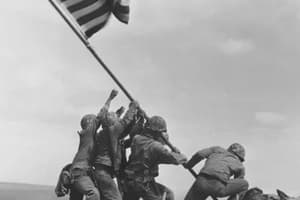Podcast
Questions and Answers
What event significantly increased American outrage and sentiment towards joining the war?
What event significantly increased American outrage and sentiment towards joining the war?
- The assassination of Archduke Ferdinand
- The attack on Pearl Harbor
- The Zimmermann Note
- The sinking of the Lusitania (correct)
What was the main purpose of the Zimmermann Note?
What was the main purpose of the Zimmermann Note?
- To encourage Mexico to declare war on the U.S. (correct)
- To request peace negotiations with the U.S.
- To propose an alliance between Germany and Britain
- To invite the U.S. to join the Central Powers
Why did the U.S. initially want to remain neutral in the conflict?
Why did the U.S. initially want to remain neutral in the conflict?
- Desire to support the Central Powers
- Strong economic ties to Germany
- American public sentiment against British involvement
- The belief that the war would not affect American interests (correct)
What was the rallying cry associated with the sinking of the Lusitania?
What was the rallying cry associated with the sinking of the Lusitania?
In which month and year did the U.S. declare war, prompted by the events discussed?
In which month and year did the U.S. declare war, prompted by the events discussed?
Flashcards are hidden until you start studying
Study Notes
U.S. Neutrality in World War I
- The U.S. had numerous motivations for maintaining neutrality during the early years of World War I, reflecting a desire to avoid foreign entanglements.
- American sympathies predominantly favored the Allies, particularly the British, due to historical ties and shared democratic values.
Key Events Leading to War
- The sinking of British passenger ships, notably the Lusitania, incited significant American outrage and heightened calls for involvement in the war.
- The phrase "Remember the Lusitania" became a powerful rallying cry, symbolizing the emotional response to attacks on American lives and interests.
- The Zimmermann Note was a pivotal moment; Germany's secret proposal urging Mexico to declare war on the U.S. escalated tensions and was perceived as a direct threat to American sovereignty.
- In April 1917, the combination of these incidents pushed the U.S. to declare war on Germany, marking its entry into World War I.
Studying That Suits You
Use AI to generate personalized quizzes and flashcards to suit your learning preferences.





